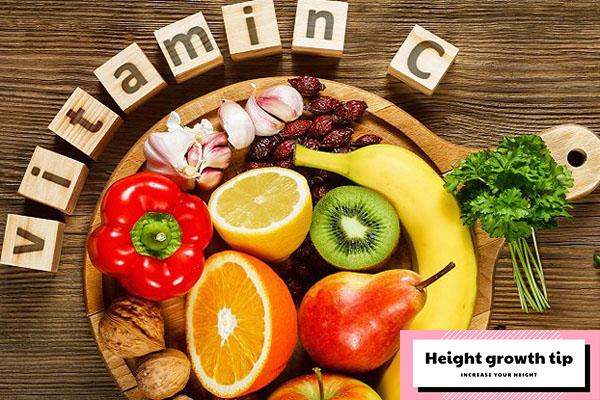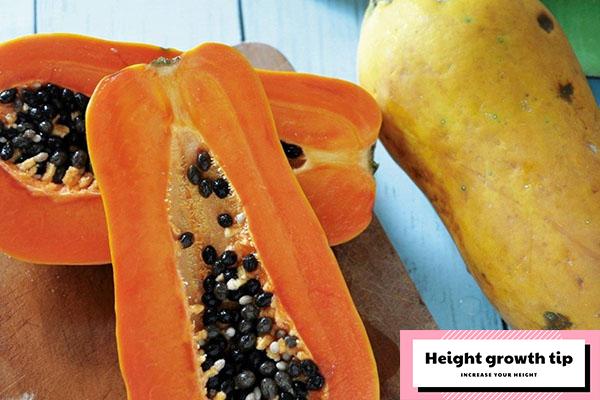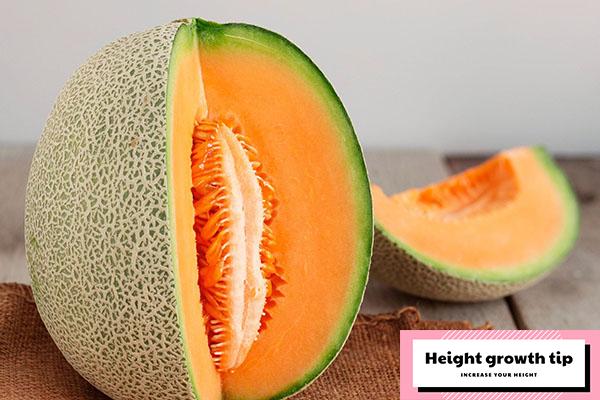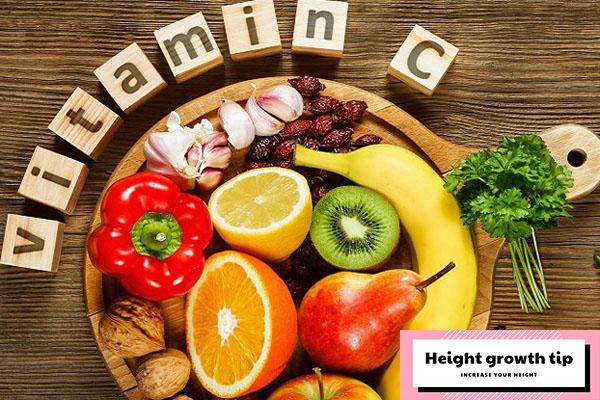Today, we’re going to explore a diverse array of foods rich in vitamin C, each offering its own unique benefits for enhancing growth potential. Whether you’re personally striving to reach new heights or seeking to support someone on their journey, this exploration promises valuable insights into the power of nutrition. So, let’s dive into the world of vitamin C-rich foods and discover how they can fuel our growth aspirations. Welcome to a journey of nourishment and growth!
What is your knowledge about vitamin C?
Vitamin C, scientifically designated as ascorbic acid, assumes a central role in the intricate tapestry of our body’s growth, development, and reparative processes. Its significance encompasses a myriad of indispensable functions, including the facilitation of swift wound healing, enhancement of iron absorption, stimulation of collagen production, and the maintenance of robust bones, teeth, and cartilage. Additionally, it serves as a staunch defender of our immune system, which is a cornerstone of holistic well-being.
However, the contributions of vitamin C extend even further. It metamorphoses into a formidable guardian, harnessing the potency of antioxidants to shield our body from the relentless onslaught of free radicals, pollutants, and harmful chemicals. This protective prowess takes on paramount importance as free radicals are implicated in the genesis of an array of conditions, ranging from heart disease to cancer and arthritis.
Furthermore, ongoing research tantalizingly suggests that vitamin C may bestow additional health benefits. These potential advantages encompass mitigating inflammation, bestowing a youthful radiance to aging skin, aiding in the fight against macular degeneration, and even potentially lowering the risk of cancer and cardiovascular ailments. Embracing a diet rich in vitamin C, therefore, emerges as a holistic strategy with far-reaching and positively impactful consequences for our overall well-being.

Does vitamin C help you grow taller?
While calcium and vitamin D are well-known for their significant roles in promoting bone health and aiding in growth, it’s important to recognize that vitamin C also plays a substantial and supportive role in these crucial aspects.
Vitamin C serves as a vital catalyst in the synthesis of fresh collagen within the body. Collagen, an essential component of the bone matrix, greatly contributes to the strength and flexibility of bones, making them more resilient against fractures and deformities. Additionally, vitamin C actively facilitates the development of bones and teeth. As mentioned earlier, the potent antioxidant properties of vitamin C help eliminate toxins from the body, thus preventing diseases, revitalizing the body’s vitality, and sustaining overall health and well-being.
Because our bodies do not store vitamin C, it becomes imperative to consistently incorporate it into our diets. The reassuring news is that there is no need to worry about excessive consumption of vitamin C, as any surplus is promptly eliminated by the body. However, it is essential to avoid surpassing the safe daily limit of 2,000 mg to prevent potential side effects such as stomach discomfort and diarrhea.
Now, let’s provide a comprehensive table outlining the recommended daily vitamin C intake for various demographic groups.
| Age | Gender | RDA (mg)/day |
| 0 – 6 months | Both of them | 40 |
| 7 – 12 months | Both of them | 50 |
| 13 years old | Both of them | 15 |
| 4 – 8 years | Both of them | 25 |
| 9 – 13 years | Both of them | 45 |
| 14 – 18 years | Girls | 65 |
| 14 – 18 years | Boy | 75 |
| 19 and older | Woman | 75 |
| 19 and older | Man | 90 |
| Pregnant teen | Girls | 80 |
| Breastfeeding teenager | Girls | 115 |
| Pregnant women | Woman | 85 |
| Breastfeeding woman | Woman | 120 |
Top 20 foods high in vitamin C to increase height
Achieving your desired height is a journey fueled by proper nutrition and healthy habits. While genetics play a significant role, incorporating foods rich in essential nutrients can maximize your potential. Here, we explore 20 remarkable foods brimming with vitamin C, a vital element for bone health and growth.
Kakadu Plums:
Hailing from the Australian outback, these exotic fruits claim the crown for the highest vitamin C content globally. Imagine, a mere 100 grams boast a staggering 2907mg, exceeding your daily recommended intake by a whopping 2769%! Relish their vibrant tartness and fibrous texture by enjoying them fresh, or unleash their culinary potential in juices, jams, and sauces.
Acerola Cherries:
These tiny cherries pack a mighty punch, delivering a generous 1677mg of vitamin C per cup (100 grams). But they offer more than just vitamin C – they’re bursting with antioxidants and anti-inflammatory properties. Savor their delightful sweet-and-sour flavor fresh, juiced, or as a delectable addition to desserts, smoothies, and more.
Rose Hips:
Unassuming yet potent, rose hips offer 426mg of vitamin C per 100 grams. These small, sweet-tangy fruits elevate your diet when used in jams, jellies, syrups, wines, or teas. However, exercise caution when handling them, as the tiny hairs inside can cause itching.
Guava:
Native to South America and Mexico, guava is a sweet treat and a nutritional powerhouse. Each 100 grams of this tropical fruit boasts a generous 228mg of vitamin C. Don’t forget, the skin is edible, further enhancing its nutritional value. So, go ahead and indulge in this delicious and healthy fruit.
Black Currants:
Offering around 200mg of vitamin C per 100 grams, black currants delight with their intense flavor. Savor their robust taste by enjoying them fresh when perfectly ripe, or try them in jams, juices, and compotes.
Parsley:
Fresh parsley isn’t just a decorative element on your plate; it’s a nutritional powerhouse. Providing 190mg of vitamin C and 548 µg of vitamin K per 100 grams, parsley offers benefits for bone health, blood, cells, and arteries. Incorporate it into a variety of dishes to enhance flavor and nutritional value.
Spinach Mustard:
Whether chopped raw or steamed, spinach mustard delivers vitamin C goodness. 100 grams of raw spinach mustard offers 130mg of vitamin C, while steamed spinach mustard retains 110mg of vitamin C. Plus, it’s rich in calcium, potassium, fiber, folate, and manganese, making it a true superfood.
Red Paprika:
Red peppers, also known as red paprika, provide 126mg of vitamin C per 100 grams. Incorporate them into salads or dishes like hummus to savor their distinctive flavor and reap the associated health benefits.
Brussels Sprouts:
Steamed Brussels sprouts pack a punch with 97mg of vitamin C (94% of your daily value) in a 100-gram serving. Plus, they offer a generous dose of vitamin K for bone health.
Cabbage:
Steamed cabbage provides 93.5mg of vitamin C per 100 grams, making it an excellent choice for nutritious meals, particularly in salads.
Kiwi:
A 100-gram serving of kiwi contains 71mg of vitamin C (68% of your daily value). This refreshing fruit’s delicious taste and high fiber content make it an ideal daily addition to your diet.
Broccoli:
Raw broccoli delivers 79mg of vitamin C (76% of your daily value) per 100 grams. You can also steam or microwave it to retain more of its vitamin C content while enjoying its myriad of nutritional benefits.
Remember, while these foods are excellent sources of vitamin C, it’s crucial to maintain a balanced diet rich in various nutrients for optimal growth and health. So, explore the diverse world of fruits, vegetables, and whole grains to fuel your height growth journey and unlock your full potential.

Pawpaw:
Nestled amidst verdant landscapes, the pawpaw emerges as a tropical treat, offering a delicate blend of melon and mango flavors. With its velvety texture and captivating scent, it is a sensory delight. Beyond its deliciousness, 100 grams of pawpaw unveil a treasure trove of 60 milligrams of vitalizing vitamin C, empowering your body and enhancing your well-being.
Strawberry:
These vibrant gems are not only visually captivating but also a treasure trove of essential nutrients. Their crimson exterior conceals a wealth of vitamin C, folate, manganese, flavonoids, and antioxidants, making them a true powerhouse of health. A mere 100 grams of strawberries bestows upon you a generous 57 milligrams of vitamin C, an impressive 55% of the daily recommended intake, making them a delicious way to boost your health.
Lemon:
Hailing from the illustrious citrus family, the humble lemon stands tall, offering a refreshingly tart flavor alongside a generous dose of vitamin C. Within every 100 grams, it boasts 53 milligrams of this vital nutrient, constituting an impressive 51% of the daily requirement. From lending a zingy touch to gourmet dishes to revitalizing your mornings with a glass of freshly squeezed lemonade, the lemon shines as a versatile source of vitamin C.
Orange:
Renowned for its prolific vitamin C content, the orange reigns supreme in the realm of citrus fruits. Each 100 grams of this vibrant fruit offers a generous 52 milligrams of vitamin C, generously providing 50% of the daily recommended allowance. This citrus sensation is a classic and effective way to support your overall health and well-being.
Lychee:
This enchanting fruit, veiled by a delicate skin, entices with its irresistible aroma and refreshing flavor. Gently peel away the skin to reveal the succulent flesh, which can be savored fresh or enjoyed in a variety of culinary creations. Beyond its delightful taste, lychees offer 45 milligrams of vitamin C per 100 grams, making them a zesty indulgence for health-conscious epicures.
Mango:
The mango, a versatile tropical treasure, graces our palates in a multitude of forms. From its luscious flesh enjoyed fresh to its inclusion in tantalizing desserts, smoothies, and salads, it offers a diverse culinary experience. A 100-gram serving of mango presents a delightful 37 milligrams of vitamin C, complemented by a healthy dose of copper and folate. This delectable fruit combines flavor and nutrition in perfect harmony.
These tropical fruits offer an exciting and delicious way to enhance your vitamin C intake and support your overall health. So, explore their unique flavors and discover the vibrant world of exotic fruits, unlocking a bounty of natural treasures for your well-being.

Cantaloupe:
Ah, the cantaloupe, that iconic fruit of summer! It doesn’t just dance on your taste buds with its exquisite flavor; it also brings a substantial dose of vitamin C to the party, giving your health a much-needed boost. Packing a generous 26 milligrams of vitamin C per 100 grams, it graciously offers up a quarter of your daily recommended intake of this essential nutrient. Whether you savor it on its own, allowing its juicy sweetness to shine, or blend it into a delightful fruit medley featuring crisp cucumbers and wholesome quinoa, the cantaloupe is a promise of refreshing and nutritious goodness for your summer palate.
Tomatoes:
Tomatoes, with their succulent juiciness and inherent sweetness, have forever captured the hearts of culinary aficionados. Beyond their culinary allure, tomatoes bring a treasure trove of antioxidants that shower numerous benefits upon your body. Just a mere 100 grams of tomatoes delivers a commendable 22 milligrams of vitamin C, making a remarkable 21% contribution to your daily recommended intake. Whether you slice these ruby-red jewels to perfection to elevate your sandwiches to gourmet heights or allow them to infuse their rich flavor into hearty stews and luscious sauces, you’re not just enhancing taste; you’re also optimizing the absorption of lycopene, a valuable compound generously found in tomatoes, thus further promoting your overall well-being.
Is Effervescent Vitamin C Truly Beneficial for Your Health?
While vitamin C can be naturally obtained from the variety of foods listed earlier, there exists a cohort of individuals who opt for effervescent vitamin C due to its unique advantages. This distinct variant of the vitamin boasts a rapid dissolution rate, ensuring swift absorption by the body. Its potential benefits encompass the fortification of immune health, fortification against infections, and the promotion of blood cell rejuvenation. Nevertheless, it is imperative to exercise caution when considering its consumption, as excessive intake could potentially lead to the formation of kidney stones, stomach ulcers, and bouts of nausea.
In summary:
Vitamin C is an indispensable nutrient, pivotal in orchestrating a plethora of critical bodily functions. Fortunately, achieving the recommended daily intake of this essential vitamin is achievable through the incorporation of a diverse array of fruits and vegetables into your diet. While the convenience of supplements like effervescent vitamin C is undeniable, it is of paramount importance to seek the guidance of a healthcare professional to ensure that you do not inadvertently exceed the optimal intake of this vital nutrient, as doing so could result in detrimental health consequences.

